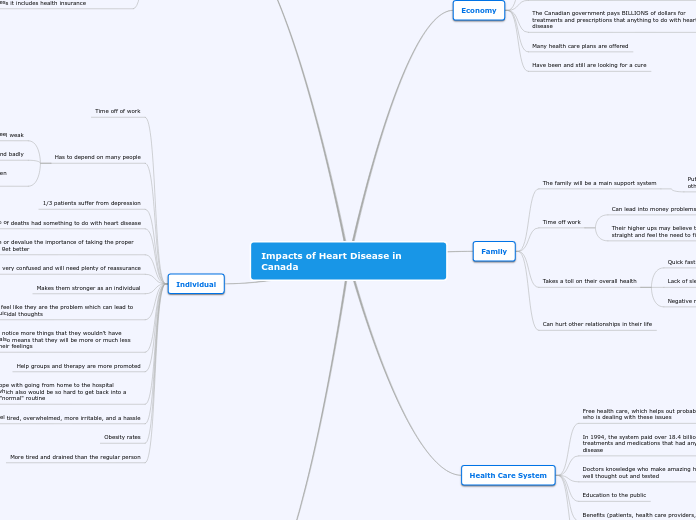Impacts of Heart Disease in Canada
Economy
1/12 of Canadians who are 20+ are currently living with some type of heart disease. This equals out to 2.4 million people
People who are richer and better off apparently don't get as many heart disease issues, rather than people who aren't as wealthy
The Canadian government pays BILLIONS of dollars for treatments and prescriptions that anything to do with heart disease
Many health care plans are offered
Have been and still are looking for a cure
Family
The family will be a main support system
Puts pressure on them to be at their best and to look after other's needs before their own
Time off work
Can lead into money problems
Their higher ups may believe they don't have their priorities straight and feel the need to fire them
Takes a toll on their overall health
Quick fast food diet
Lack of sleep
Negative mood and pessimistic thoughts
Can hurt other relationships in their life
Health Care System
Free health care, which helps out probably every Canadian who is dealing with these issues
In 1994, the system paid over 18.4 billion dollars in treatments and medications that had anything to do with heart disease
Doctors knowledge who make amazing health plans that are well thought out and tested
Education to the public
Benefits (patients, health care providers, family members, etc)
Is always undergoing changes to accommodate new patients and cases to best suit the population
Employment
Difficult to find an employer who is comfortable losing someone who is constantly needing time off for treatments
Hard to find a job if you don't have one already
They would have to work part-time and that doesn't help keep up with bills and costs that go along with life, let alone medical treatment
VERY difficult to cope with the motivational aspect of getting up for work
The jobs and duties must be limited because heart patients have limited control over their disease. They can't lift heavy things, they can't be in a high stress environment, etc
Some patients might not think there is much of a point in getting a job unless it includes health insurance
Individual
Time off of work
Has to depend on many people
Can make them feel weak
Can make them feel helpless and badly
Pushes themselves too hard to things on their own, even though they shouldn't be
1/3 patients suffer from depression
32% of deaths had something to do with heart disease
Can promote or devalue the importance of taking the proper measures to get better
Will be very confused and will need plenty of reassurance
Makes them stronger as an individual
Makes them feel like they are the problem which can lead to things like suicidal thoughts
Will begin to notice more things that they wouldn't have before, this also means that they will be more or much less intact with their feelings
Help groups and therapy are more promoted
Difficult to cope with going from home to the hospital constantly, which also would be so hard to get back into a regular and "normal" routine
Feel tired, overwhelmed, more irritable, and a hassle
Obesity rates
More tired and drained than the regular person
Media (Advertising, television, music etc.)
Can convince people to stop using a product because it can lead of heart disease (roller coasters, antidepressants, etc)
Spreads myths about diseases. Most people have NO idea about heart diseases unless they know somebody who has one
They seem to sugarcoat things and give people a false perception
Doesn't teach anything, people have to do their own research
Allows current and former patients to tell their stories
Can reduce physical activity and make somebody sit around with media rather than get healthy and active
